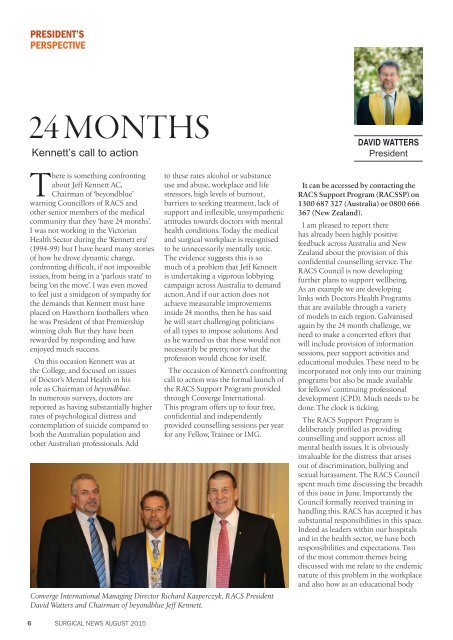SURGICAL NEWS
b6dhb_f
b6dhb_f
- No tags were found...
Create successful ePaper yourself
Turn your PDF publications into a flip-book with our unique Google optimized e-Paper software.
PRESIDENT’S<br />
PERSPECTIVE<br />
24 MONTHS<br />
DAVID WATTERS<br />
President<br />
Kennett’s call to action<br />
There is something confronting<br />
about Jeff Kennett AC,<br />
Chairman of ‘beyondblue’<br />
warning Councillors of RACS and<br />
other senior members of the medical<br />
community that they ‘have 24 months’.<br />
I was not working in the Victorian<br />
Health Sector during the ‘Kennett era’<br />
(1994-99) but I have heard many stories<br />
of how he drove dynamic change,<br />
confronting difficult, if not impossible<br />
issues, from being in a ‘parlous state’ to<br />
being ‘on the move’. I was even moved<br />
to feel just a smidgeon of sympathy for<br />
the demands that Kennett must have<br />
placed on Hawthorn footballers when<br />
he was President of that Premiership<br />
winning club. But they have been<br />
rewarded by responding and have<br />
enjoyed much success.<br />
On this occasion Kennett was at<br />
the College, and focused on issues<br />
of Doctor’s Mental Health in his<br />
role as Chairman of beyondblue.<br />
In numerous surveys, doctors are<br />
reported as having substantially higher<br />
rates of psychological distress and<br />
contemplation of suicide compared to<br />
both the Australian population and<br />
other Australian professionals. Add<br />
to these rates alcohol or substance<br />
use and abuse, workplace and life<br />
stressors, high levels of burnout,<br />
barriers to seeking treatment, lack of<br />
support and inflexible, unsympathetic<br />
attitudes towards doctors with mental<br />
health conditions. Today the medical<br />
and surgical workplace is recognised<br />
to be unnecessarily mentally toxic.<br />
The evidence suggests this is so<br />
much of a problem that Jeff Kennett<br />
is undertaking a vigorous lobbying<br />
campaign across Australia to demand<br />
action. And if our action does not<br />
achieve measurable improvements<br />
inside 24 months, then he has said<br />
he will start challenging politicians<br />
of all types to impose solutions. And<br />
as he warned us that these would not<br />
necessarily be pretty, nor what the<br />
profession would chose for itself.<br />
The occasion of Kennett’s confronting<br />
call to action was the formal launch of<br />
the RACS Support Program provided<br />
through Converge International.<br />
This program offers up to four free,<br />
confidential and independently<br />
provided counselling sessions per year<br />
for any Fellow, Trainee or IMG.<br />
Converge International Managing Director Richard Kasperczyk, RACS President<br />
David Watters and Chairman of beyondblue Jeff Kennett.<br />
It can be accessed by contacting the<br />
RACS Support Program (RACSSP) on<br />
1300 687 327 (Australia) or 0800 666<br />
367 (New Zealand).<br />
I am pleased to report there<br />
has already been highly positive<br />
feedback across Australia and New<br />
Zealand about the provision of this<br />
confidential counselling service. The<br />
RACS Council is now developing<br />
further plans to support wellbeing.<br />
As an example we are developing<br />
links with Doctors Health Programs<br />
that are available through a variety<br />
of models in each region. Galvanised<br />
again by the 24 month challenge, we<br />
need to make a concerted effort that<br />
will include provision of information<br />
sessions, peer support activities and<br />
educational modules. These need to be<br />
incorporated not only into our training<br />
programs but also be made available<br />
for fellows’ continuing professional<br />
development (CPD). Much needs to be<br />
done. The clock is ticking.<br />
The RACS Support Program is<br />
deliberately profiled as providing<br />
counselling and support across all<br />
mental health issues. It is obviously<br />
invaluable for the distress that arises<br />
out of discrimination, bullying and<br />
sexual harassment. The RACS Council<br />
spent much time discussing the breadth<br />
of this issue in June. Importantly the<br />
Council formally received training in<br />
handling this. RACS has accepted it has<br />
substantial responsibilities in this space.<br />
Indeed as leaders within our hospitals<br />
and in the health sector, we have both<br />
responsibilities and expectations. Two<br />
of the most common themes being<br />
discussed with me relate to the endemic<br />
nature of this problem in the workplace<br />
and also how as an educational body<br />
6 <strong>SURGICAL</strong> <strong>NEWS</strong> AUGUST 2015


